Kaist
Korean

Announcements
College of Engineering Notice
-
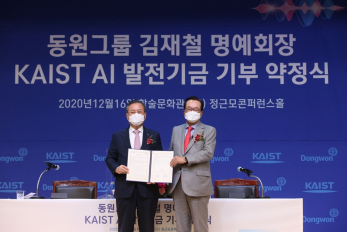
Dongwon Chairman Donates ₩50 Billion to Fund AI Graduate Sch..
< Dongwon Group Honorary Chairman and Founder Jae-chul Kim > Dongwon Group Honorary Chairman and Founder Jae-chul Kim donated his private property worth ₩50 billion (US $46 million) to KAIST on December 16. Honorary Chairman Kim’s gift will fund the KAIST Graduate School of AI (GSAI), which was established last year. The KAIST GSAI will be re-named the ‘Kim Jae-chul Graduate School of AI’ to honor Honorary Chairman Kim. This is the third major donation that KAIST has received this year following KAIST Development Foundation Chairman Soo-Young Lee’s ₩67.6 billion in real estate in July and another ₩10 billion from a KAIST alumnus, Chairman Byeong-Gyu Chang of Krafton, in January. “KAIST, as the cradle that trains Korea’s best talents in science and technology, has been at the forefront of leading national development over the past 50 years. I hope that KAIST will also strive to nurture global talents who excel in AI innovation and steer Korea’s new advancements to lead the Fourth Industrial Revolution,” said Honorary Chairman Kim during the donation ceremony at KAIST’s main campus in Daejeon. The ceremony was held in strict compliance with Level Two social distancing guidelines and measures in response to the persistent coronavirus. Less than 50 people, including Honorary Chairman Kim’s family, President Sung-Chul Shin, and professors from key posts at KAIST, attended the ceremony. Dongwon Group is one of the leading fishery companies in Korea, established in 1969 by Honorary Chairman Kim. He recalled memories of his childhood as he explained the background of the donation, saying, “When I was young, I searched for Korea’s future in the world’s oceans. However, a new future lies in the ‘oceans of data.’” “I have been pondering how I could further contribute to my country, and realized that bringing up talented individuals in the AI and data science-related fields is important. I hope that my donation today will aid the take-off of KAIST’s great voyage towards becoming a global “flagship” in the new eras to come,” Honorary Chairman Kim added. To this, President Shin responded acclaiming the noblesse oblige held by Honorary Chairman Kim to further develop Korea’s science and technology and make Korea into a leader in AI innovation. “We will always keep KAIST’s role and mission close to our hearts and do our best to make KAIST into a global hub for talent cultivation and R&D in AI, based on Honorary Chairman Kim’s donation,” said President Shin. With Honorary Chairman Kim’s donation, the KAIST GSAI will first expand its faculty in both quantity and quality. By expanding the number of full-time, highly qualified professors to 40 by 2030, the School will train the most talented personnel in fusion and convergence AI. The KAIST GSAI opened in August 2019 as the first school in Korea to be selected as part of the ‘2019 Graduate School for AI Support Project’ by the Ministry of Science and ICT. The current faculty is composed of 13 full-time professors including ex-researchers from AI labs of global conglomerates including Google, IBM Watson, and Microsoft, as well as eight adjunct professors, making a total of 21 faculty members. There are currently 138 students attending the School, including 79 master’s students, 17 in the integrated MS-PhD program, and 42 PhD candidates. < KAIST President Sung-Chul Shin (left) and Dongwon Group Honorary Chairman and Founder Jae-chul Kim (right) at the Donation Ceremony. > (END)
-
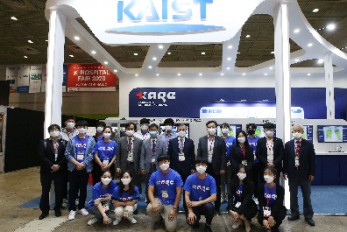
KAIST Showcases Healthcare Technologies at K-Hospital Fair 2..
KAIST Pavilion showcased its innovative medical and healthcare technologies and their advanced applications at the K-Hospital Fair 2020. Five KAIST research groups who teamed up for the Post-COVID-19 New Deal R&D Initiative Project participated in the fair held in Seoul last week. The K-Hospital Fair is a yearly event organized by the Korean Hospital Association to present the latest research and practical innovations to help the medical industry better serve the patients. This year, 120 healthcare organizations participated in the fair and operated 320 booths. At the fair, a research group led by Professor Il-Doo Kim from the Department of Materials Science and Engineering demonstrated the manufacturing process of orthogonal nanofibers used to develop their ‘recyclable nano-fiber filtered face mask’ introduced in March of this year. This mask has garnered immense international attention for maintaining its sturdy frame and filtering function even after being washed more than 20 times. Professor Kim is now extending his facilities for the mass production of this mask at his start-up company. While awaiting final approval from the Ministry of Food and Drug Safety to bring his product into the market, Professor Kim is developing other mask variations such as eco-friendly biodegradable masks and transparent masks to aid the hearing-impaired who rely on lip reading to communicate. < Manufacturing process of orthogonal nanofibers > The team working under Professor Wonho Choe from the Department of Nuclear and Quantum Engineering presented two low-temperature plasma sterilizers for medical use, co-developed with Plasmapp, a start-up company founded by a KAIST alumnus. Their sterilizers are the first ones that can sterilize medical devices by diffusing hydrogen peroxide vapor into the pouch. They rapidly sterilize medical instruments and materials in just seven minutes without leaving toxic residue, while reducing sterilization time and costs by 90%. < Low-temperature plasma sterilizers for medical use > Professor Hyung-Soon Park and his researchers from the Department of Mechanical Engineering introduced a smart protective suit ventilation system that features high cooling capacity and a slimmed-down design. For comfortable use, the suit is equipped with a technique that monitors its inner temperature and humidity and automatically controls its inner circulation accordingly. The group also presented a new system that helps a person in a contaminated suit undress without coming into contact with the contaminated outer part of the suit. < Smart protective suit ventilation system > Professor Jong Chul Ye's group from the Department of Bio and Brain Engineering demonstrated AI software that can quickly diagnose an infectious disease based on chest X-ray imaging. The technique compares the differences in the severity of pneumonia in individual patients to distinguish whether their conditions fall under viral pneumonia including COVID-19, bacterial pneumonia, tuberculosis, other diseases, or normal conditions. The AI software visualizes the basis of its reasoning for each of the suspected diseases and provides them as information that can be utilized by medical personnel. < Infectious disease diagnostic AI software based on chest X-ray imaging > Finally, researchers of Professor Ki-Hun Jeong’s team from the Department of Bio and Brain Engineering demonstrated their ultra-high-speed sub-miniature molecular diagnostic system for the on-site diagnosis of diseases. The existing Polymerase Chain Reaction (PCR) diagnostic usually takes from 30 minutes to an hour to provide results, but their new technique using an LED light source can present results within just three minutes and it is expected to be used actively for on-site diagnosis. < Ultra-high-speed sub-miniature molecular diagnostic system using LED light source > Professor Choongsik Bae, the Director of the Post-COVID-19 New Deal R&D Initiative Project, said, “KAIST will build a healthy relationship amongst researchers, enterprises, and hospitals to contribute to the end of COVID-19 and build a new paradigm of Korean disease prevention and control.” KAIST launched the Post-COVID-19 New Deal R&D Initiative in July with the support of the Ministry of Science and ICT of Korea. This unit was created to overcome the pandemic crisis by using science and technology, and to contribute to economic development by creating a new antiviral drug industry. The unit is comprised of 464 KAIST members including professors, researchers, and students as well as 503 professionals from enterprises, hospitals, and research centers. (END)
-
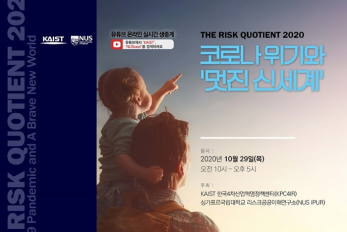
Experts to Help Asia Navigate the Post-COVID-19 and 4IR Eras..
Risk Quotient 2020, an international conference co-hosted by KAIST and the National University of Singapore (NUS), will bring together world-leading experts from academia and industry to help Asia navigate the post-COVID-19 and Fourth Industrial Revolution (4IR) eras. The online conference will be held on October 29 from 10 a.m. Korean time under the theme “COVID-19 Pandemic and A Brave New World”. It will be streamed live on YouTube at https://www.youtube.com/c/KAISTofficial and https://www.youtube.com/user/NUScast. The Korea Policy Center for the Fourth Industrial Revolution (KPC4IR) at KAIST organized this conference in collaboration with the Lloyd's Register Foundation Institute for the Public Understanding of Risk (IPUR) at NUS. During the conference, global leaders will examine the socioeconomic impacts of the COVID-19 pandemic on areas including digital innovation, education, the workforce, and the economy. They will then highlight digital and 4IR technologies that could be utilized to effectively mitigate the risks and challenges associated with the pandemic, while harnessing the opportunities that these socioeconomic effects may present. Their discussions will mainly focus on the Asian region. In his opening remarks, KAIST President Sung-Chul Shin will express his appreciation for the Asian populations’ greater trust in and compliance with their governments, which have given the continent a leg up against the coronavirus. He will then emphasize that by working together through the exchange of ideas and global collaboration, we will be able to shape ‘a brave new world’ to better humanity. Welcoming remarks by Prof. Sang Yup Lee (Dean, KAIST Institutes) and Prof. Tze Yun Leong (Director, AI Technology at AI Singapore) will follow. For the keynote speech, Prof. Lan Xue (Dean, Schwarzman College, Tsinghua University) will share China’s response to COVID-19 and lessons for crisis management. Prof. Danny Quah (Dean, Lee Kuan Yew School of Public Policy, NUS) will present possible ways to overcome these difficult times. Dr. Kak-Soo Shin (Senior Advisor, Shin & Kim LLC, Former Ambassador to the State of Israel and Japan, and Former First and Second Vice Minister of the Ministry of Foreign Affairs of the Republic of Korea) will stress the importance of the international community’s solidarity to ensure peace, prosperity, and safety in this new era. Panel Session I will address the impact of COVID-19 on digital innovation. Dr. Carol Soon (Senior Research Fellow, Institute of Policy Studies, NUS) will present her interpretation of recent technological developments as both opportunities for our society as a whole and challenges for vulnerable groups such as low-income families. Dr. Christopher SungWook Chang (Managing Director, Kakao Mobility) will show how changes in mobility usage patterns can be captured by Kakao Mobility’s big data analysis. He will illustrate how the data can be used to interpret citizen’s behaviors and how risks can be transformed into opportunities by utilizing technology. Mr. Steve Ledzian’s (Vice President, Chief Technology Officer, FireEye) talk will discuss the dangers caused by threat actors and other cyber risk implications of COVID-19. Dr. June Sung Park (Chairman, Korea Software Technology Association (KOSTA)) will share how COVID-19 has accelerated digital transformations across all industries and why software education should be reformed to improve Korea’s competitiveness. Panel Session II will examine the impact on education and the workforce. Dr. Sang-Jin Ban (President, Korean Educational Development Institute (KEDI)) will explain Korea’s educational response to the pandemic and the concept of “blended learning” as a new paradigm, and present both positive and negative impacts of online education on students’ learning experiences. Prof. Reuben Ng (Professor, Lee Kuan Yew School of Public Policy, NUS) will present on graduate underemployment, which seems to have worsened during COVID-19. Dr. Michael Fung’s presentation (Deputy Chief Executive (Industry), SkillsFuture SG) will introduce the promotion of lifelong learning in Singapore through a new national initiative known as the ‘SkillsFuture Movement’. This movement serves as an example of a national response to disruptions in the job market and the pace of skills obsolescence triggered by AI and COVID-19. Panel Session III will touch on technology leadership and Asia’s digital economy and society. Prof. Naubahar Sharif (Professor, Division of Social Science and Division of Public Policy, Hong Kong University of Science and Technology (HKUST)) will share his views on the potential of China in taking over global technological leadership based on its massive domestic market, its government support, and the globalization process. Prof. Yee Kuang Heng (Professor, Graduate School of Public Policy, University of Tokyo) will illustrate how different legal and political needs in China and Japan have shaped the ways technologies have been deployed in responding to COVID-19. Dr. Hayun Kang (Head, International Cooperation Research Division, Korea Information Society Development Institute (KISDI)) will explain Korea’s relative success containing the pandemic compared to other countries, and how policy leaders and institutions that embrace digital technologies in the pursuit of public welfare objectives can produce positive outcomes while minimizing the side effects. Prof. Kyung Ryul Park (Graduate School of Science and Technology Policy, KAIST) will be hosting the entire conference, whereas Prof. Alice Hae Yun Oh (Director, MARS Artificial Intelligence Research Center, KAIST), Prof. Wonjoon Kim (Dean, Graduate School of Innovation and Technology Management, College of Business, KAIST), Prof. Youngsun Kwon (Dean, KAIST Academy), and Prof. Taejun Lee (Korea Development Institute (KDI) School of Public Policy and Management) are to chair discussions with the keynote speakers and panelists. Closing remarks will be delivered by Prof. Chan Ghee Koh (Director, NUS IPUR), Prof. So Young Kim (Director, KAIST KPC4IR), and Prof. Joungho Kim (Director, KAIST Global Strategy Institute (GSI)). “This conference is expected to serve as a springboard to help Asian countries recover from global crises such as the COVID-19 pandemic through active cooperation and joint engagement among scholars, experts, and policymakers,” according to Director So Young Kim. < RQ2020 Conference Program > (END)
-
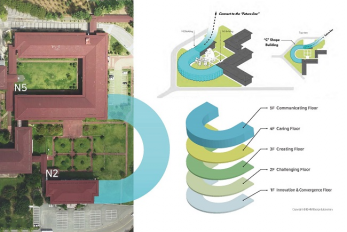
Fundraising for the 50th Anniversary Memorial Building Kicks..
KAIST started the fundraising campaign to construct the 50th Anniversary Memorial Building. This is one of the projects and events the 50th Anniversary Commemorative Committee established to celebrate the anniversary. The ground will be broken in 2022 after raising approximately 50 billion KRW through 2021. The five-story building will be the latest addition to the KAIST campus. To highlight the campus’s history, the new building will connect the N5 (Basic Experiment & Research) and N2 (Administration Branch) buildings, the first buildings on the main Daejeon campus after its main campus moved from Seoul in 1987. Currently, the College of Business remains at the Seoul campus. The 50th Anniversary Memorial Building will connect the two buildings in the shape of C, and represent KAIST’s C3 core value of Challenging, Creating, and Caring. The concept of this building was designed by Professor Sang-Min Bae from the Department of Industrial Design. The 50th Anniversary Commemorative Committee said the Memorial Building will reflect the spirit of its core values. The first floor will accommodate the auditorium and exhibition hall, showcasing the latest achievements in KAIST innovation and convergence research as well as alumni startups and companies. The second floor will be an education space for entrepreneurship and video studios. An area for delivering creative education platforms such as Education 4.0 will be prepared on the third floor. The fourth floor will be used for global leadership education. The fifth floor will house the KAIST Club, a lounge for alumni and the Global Strategy Institute. Co-Chair of the Fundraising & PR Sub-Committee of the KAIST 50th Anniversary Commemorative Committee and Former Vice President for Planning and Budget Seung-Bin Park and current Vice President for Planning and Budget Suchan Chae reiterated the importance of extending the infrastructure of the campus, saying that investments in the infrastructure will expand the university’s future growth potential. In a letter to kick off the fundraising efforts last month, they called for support from the entire KAIST community to help construct the new memorial building that will produce global talents and help young scientists make their dreams come true. To donate, click here < The design concept of the 50th Anniversary Memorial Building by the ID+IM Design Laboratory at KAIST. >
-
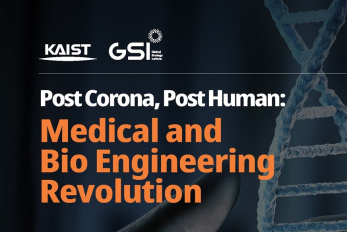
Life After Covid-19: Big Questions on Medical and Bio-Engine..
KAIST GSI forum explores big questions in the medical and bio-engineering revolution caused by the COVID-19 in fight against infectious diseases and life quality On September 9, the Global Strategy Institute at KAIST will delve into innovative future strategies for the medical and bio-engineering sectors that have been disrupted by COVID-19. The forum will live stream via YouTube, KTV, and Naver TV from 9:00 am Korean time. The online forum features a speaker lineup of world-renowned scholars who will discuss an array of bio-engineering technologies that will improve our quality of life and even extend our life span. This is the GSI’s third online forum since the first one in April that covered the socio-economic implications of the global pandemic and the second one in June focusing on the education sector. In hosting the third round of the GSI Forum series, KAIST President Sung-Chul Shin stressed the power of science and technology saying, “In this world full of uncertainties, one thing for sure is that only the advancement of science and technology will deliver us from this crisis.” Korean Prime Minister Sye-Kyun Chung will also deliver a speech explaining the government’s response to COVID-19 and vaccine development strategies. The President of the National Academy of Medicine in the US will share ideal policies to back up the bio-engineering and medical sectors and Futurist Thomas Frey from the Davinci Institute will present his distinct perspectives on our future lives after COVID-19. His thought-provoking insights on advancements in the bioengineering sector will examine whether humanity can put an end to infectious diseases and find new ways to lengthen our lives. Two distinguished professors in the field of genetic engineering technology will share their latest breakthroughs. Professor George McDonald Church from Harvard Medical School who developed genome sequencing will deliver a keynote speech on how the advancement of gene editing and genome technology will overcome diseases and contribute to extending human life spans. Professor Kwang-Soo Kim, a KAIST alumnus from Harvard Medical School who recently reported new discoveries for Parkinson’s disease treatment by reprogramming a patient’s own skin cells to replace cells in the brain, will introduce the latest clinical cell treatment technologies based on personalized therapeutics. Senior Vice President and Chief Product Officer of Illumina Susan Tousi, a leading genome sequencing solution provider, will describe genome analysis technology and explore the potential for disease prevention. KAIST medical scientist Jeong Ho Lee, who was the first to identify the causes of intractable epilepsies and has identified the genes responsible for several developmental brain disorders. Professor Jin-Hyung Lee from Stanford University and Dr. David B. Resnik from the National Institute of Environmental Health Science will also join the speaker lineup to discuss genetics-based personalized solutions to extend human life spans. The forum will also invite about 50 young scientists and medical researchers from around the world to participate in an online panel session. They will engage in a Q&A session and a discussion with the speakers. (END)
-
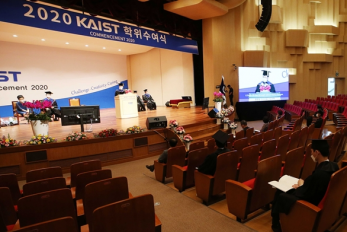
Virtual Commencement Ceremony Honors the Class of 2020
< Graduates were divided into three groups to attend at three different places and watched the ceremony via Zoom. > The KAIST community gathered online to celebrate the 2020 graduating class. The blended ceremony conferred their hard-earned degrees on August 28. The belated celebration, which was postponed from February 21 due to the COVID-19 outbreak, honored the 2846 graduates with live streaming on YouTube beginning at 2:00 pm. The graduates include 721 PhDs and 1399 master’s degree holders. The government raised its social distancing guidelines to level two out of three on August 23 as the second wave of the virus hit the nation. Level two guidelines prohibit the gathering of more than 50 persons indoors or 100 persons outdoors. For the virtual ceremony, the Office of Student Affairs and Policy announced a list of 67 graduates who signed up to participate in the graduation ceremony. Graduates were divided into three groups to attend at three different places and watch the ceremony via Zoom. No family and friends of the graduates were allowed to participate at the campus. < Kon-Yong Lee from the Department of Chemical and Biomolecular Engineering, received the Award of Minister of Science and Technology. > This year’s valedictorian, Kon-Yong Lee from the Department of Chemical and Biomolecular Engineering, received the Award of Minister of Science and Technology. Salutorian Hee-Kwang Roh from the Department of Chemistry received the Award of the KAIST Board of Trustees, while the recipient of the KAIST Presidential Award was Hong Jae-Min from the School of Computing. President Sung-Chul Shin, Chairman of the Board of Trustees Woo-Sik Kim, former Minister of Science and Technology and former Provost at KAIST Dr. KunMo Chung, and a very limited number of faculty and staff members officiated the commencement ceremony from the KAIST auditorium. President Shin in his commencement speech applauded the graduates’ hard work and dedication and delivered a very special congratulatory message to them. He encouraged the new graduates to be courageous enough to deal with these new challenges as well as future uncertainties, during the greatest transformation brought about by COVID-19. “Instead of following behind others as a fast follower, we should take the initiative and walk down new paths as a first mover.” He also stressed, “We can transform this crisis into an opportunity by practicing the C3 values KAIST pursues: Challenging, Creating, and Caring.” As new alumni of Korea’s top science and technology university, he said, “Our graduates should focus on creating the world’s best, first, or only one in their research or their work.” However, he also pointed out the importance of a caring mind for others when working together. At the ceremony, KAIST conferred an honorary doctorate degree to Dr. Younghoon David Kim, CEO and Chairman of Daesung Group, in recognition of his lifetime dedication to making innovations in the energy industry. < KAIST conferred an honorary doctorate degree to Dr. Younghoon David Kim, CEO and Chairman of Daesung Group, in recognition of his lifetime dedication to making innovations in the energy industry. > Daesung Group is a leading energy company in Korea which manufactures and supplies natural gas for industries and home users. Dr. Kim is committed to making efficient energy sources by advancing cutting-energy sciences and disruptive technologies. He has served as chairman of the World Energy Council since 2016. In his acceptance speech, Kim stressed the Grand Energy Transition as a new driving force in the future energy industry for maximizing energy efficiency. “Since energy is the most basic foundation for all industries, improvements in energy efficiency translate into benefits for all related industries in terms of its efficiency and productivity.” “The Grand Energy Transition is progressing widely and rapidly across the entire value chain of energy production, distribution, and consumption with decarbonization, decentralization, and digitalization serving as its driving force.” He went on, “We should regard energy efficiency not as the fifth fuel but the first primary fuel.” (END)
-

KAIST Technology Value Tops in Commercialization Market
KAIST became the first Korean university to achieve 10.183 billion KRW in annual technology royalties, and was also selected as an ‘Institution of Outstanding Patent Quality Management’ and an ‘Institution of Outstanding Public Patent Technology Transfer’ for 2020. KAIST earns its technology royalties through 56 technology transfer contracts. Following KAIST in the rankings were Seoul National University (SNU) in second place with 8.8 billion KRW from 87 contracts and Korea University (KU) in the third with 5.4 billion KRW from 133 contracts. The data shows the high value of KAIST-created technology in the market. The Korean Intellectual Property Office (KIPO) started to recognize the Institution of Outstanding Patent Quality Management this year to encourage profit-driven patent management at universities and public research institutes, and KAIST was selected as one of the four first recipients of this distinction. In addition, KAIST was selected as an Institution of Outstanding Public Patent Technology Transfer, a title given by KIPO to three universities and public research institutes this year with outstanding achievements in technology transfers and commercialization to encourage patent utilization. Director of the KAIST Institute of Technology Value Creation (ITVC) Professor Kyung-cheol Choi said that KAIST’s achievement in annual technology royalties and technology transfers and commercialization were prime examples of accelerating competitiveness in intellectual property through innovative R&D investment. In April, KAIST expanded and reorganized its Industry-Academia Collaboration Team into the ITVC to support technology transfers and commercialization. Specialized organizations such as the Intellectual Property and Technology Transfer Center and Industrial Liaison Center have been established under the ITVC, and industry experts have been recruited as special professors focusing on industry-academia collaborations to enhance its specialized functions. KAIST also operates an enterprise membership system and technology consulting system, aimed at sharing its outstanding intellectual property within domestic industries. In 2019, it secured a technology transfer commercialization fund of 1.2 billion KRW available for three years under KIPO’s Intellectual Property Profit Reinvestment Support Program (formerly the Korean Patent Gap Fund Creation Project). This program was introduced to bridge the gap between the technology developed in universities and the level of technology required by industry. Under the program, bold investments are made in early-stage technologies at the research paper or experiment phase. The program encourages enterprises to take active steps for the transfer of technologies by demonstrating their commercial potential through prototype production, testing and certification, and standard patent filing. KAIST is currently funding approximately 20 new technologies under this program as of July 2020. KAIST’s outstanding intellectual property management has also received international recognition, with its selection as Asia’s leading institution in university R&D intellectual property at the Intellectual Property Business Congress (IPBC) Asia 2019 held in Tokyo, Japan last October. (END)
-

KAIST Receives $57 Million Donation to Enhance Research
< President Shin and Chairman Lee pose after the signing of the donation at KAIST on July 23. > The largest amount since the opening of KAIST will fund ‘Singularity Professors’ KAIST Development Foundation Chairman Soo-Young Lee made a gift of real estate estimated at approximately $57 million on July 23. This is the largest donation KAIST has received since it was founded in 1971. The fund will establish the “Soo-Young Lee Science Education Foundation” and the proceeds of the foundation will go to the “Singularity Professors” as necessary resources to help make discoveries and design new approaches to accelerate breakthroughs. “KAIST should be the institute that will produce first Korean Nobel laureate in the field of science. I hope this fund will be utilized to enable Korea to stand out in this challenging time by accomplishing breakthroughs nobody has never imagined,” said Chairman Lee during the donation ceremony at KAIST’s campus in Daejeon. This is Chairman Lee’s third donation following the $6.7 million donation in 2012 and the $830,000 donation in 2016. Chairman Lee began her career as a journalist in 1963. In 1981, she started her own business by launching Kwangwon Ranch and became a successful businesswoman. In 1988, Chairman Lee established the real estate company Kwangwon Industries. After receiving an honorary doctorate from KAIST in 2012, she has served as the chairman of the KAIST Development Foundation from 2013. Chairman Lee expressed her intention to make another donation to KAIST in the near future during the news conference. “People matter most for advancing the world. KAIST has a very distinct mission to foster the brightest minds and will drive the nation to move forward. I have worked with KAIST for quite long time so that I have a strong belief that KAIST is the one that will not only make contributions to Korea but also to all humanity,” she explained. “For example, about one-fourth of the R&D manpower at Samsung Electronics is from KAIST. In 2019, Samsung Electronics recorded a revenue of approximately $206 billion which accounted for about 16% of national GDP. KAIST is the one that fosters global talents who are working at global company such as Samsung and many others.” KAIST President Sung-Chul Shin also expressed his deep respect for Chairman Lee’s decision, saying that the entire KAIST community will make every effort to keep up Chairman Lee’s noble idea encouraging KAIST to push forward and help realize KAIST’s role and mission. (END)
-

Singularity Professors Represent the Future of Research at K..
KAIST will launch a Singularity Professor track, which gives more freedom to researchers for pursuing their research goal. This more flexible and creative research environment institutionally supports researchers as they dive deeper into their research for a longer period of time without any strings attached. The track was established in an effort to ensure more competitive researchers who can lead the way for new advances in science and technology. This innovative research initiative is part of KAIST’s expansive effort to envision and position itself to build global research competitiveness in the wake of its 50th anniversary in 2021 and beyond. From this year, KAIST will select two to three research faculty for this special track with full-scale funding for 10 years. Singularity Professors will have their annual performance evaluations waived for 10 years. Instead, their research will be reviewed in their fifth year. The professors in this track will not participate in government-funded R&D projects and be fully funded by KAIST’s endowment. In addition to those newly hired into this track, Singularity Professorships are opens to existing faculty members. The selection criteria are very simple but highly demanding: one who can pivot an existing academic paradigm or invent a new discipline by presenting a novel scientific theory. KAIST recently hosted a briefing session for current faculty members and encouraged them to apply for the new track. As part of the selection criteria, the research topic’s innovativeness, feasibility, and appropriateness will be major factors for this track. Employment under this track will continue for up to 20 years. After receiving an evaluation of Very Satisfactory at the end of first ten-year contract, another ten years will be added. President Sung-Chul Shin, who has pushed for this system since he took office in 2017, said during the briefing session, “It takes quite a long time to bear fruit in academics, especially in science. I am very delighted that KAIST is paving the way for building a longer-term research environment which allows full and longer commitments for research that the faculty is excited to try. That’s the first step to sow the seeds for bearing fruit in academics, especially in science.” This is a paradigm shift to embrace transformation in a new era. The new institutional strategy supports the change from a fast follower to a first mover during these technologically turbulent times. Under its Global Singularity Research Projects initiative, KAIST already selected focus research topics in the most challenging as well as most creative fields of neuro-rehabilitation, new materials, and molecular optogenetics. “Especially in the post-COVID era, we have a very clear mission for the world. Our knowledge should translate into global value that can benefit those suffering from this pandemic, and mitigate the inequity coming from the digital discrepancies,” President Shin added. (END)
-

COVID-19 Update: Fall Semester to Continue Offering Classes ..
KAIST announced that the university would continue online classes through the fall semester. However, the university will conduct additional in-person classes for upper-level undergraduate lab classes and some graduate courses where on-site interaction was deemed to be highly necessary. Some 600-level graduate courses at the Daejeon campus and graduate courses at the Seoul campus will carry out both in-person and online classes. The fall semester will start from August 31. Provost and Executive Vice President Kwang Hyung Lee announced the fall semester plan in his letter to the entire student body on July 9. He said that the university decided to continue with online classes in consideration of the safety of KAIST community members and the current status of the COVID-19 spread. However, he said the new plan will help students choose class options between in-person and online classes. “Although the number of classes with two versions is limited, we believe this will help many students continue learning without the sustained face-to-face contact that is inherent in residential education,” Provost Lee said. In-person classes conducted in the fall semester will also be provided online for students who are not available for in-person classes. Students may choose the type of the classes they prefer according to their situation, among only the courses that will offer two versions. Professors will decide if they will conduct two versions of their classes. The Office of Academic Affairs is collecting the professors’ applications for conducting both versions until July 24. KAIST offered real-time online classes and pre-recorded KLMS (KAIST Learning Management System) classes during the spring semester with a very limited number of in-person lab classes for graduate courses and these two versions of online class will continue for fall semester. Provost Lee asked the students who will take the in-person classes to strictly observe all precaution measures as the university will do its best to abide by the government guidelines against the Covid-19 in preparation for the fall semester. “We will continue to make appropriate and safe accommodations for them,” said Provost Lee. Those who need to reside in on-campus dormitories are required to be approved for moving. The applications will open after all the in-person class schedules are fixed next month. However, students who were approved for staying in the dormitories last semester can move in without additional approval procedures for the fall semester. (END)
-

Education, a Silver Lining in the Dark COVID-19 Cloud
If there is a silver lining behind the COVID-19 pandemic clouds engulfing the world in darkness, it would be ‘education’. The disruption caused by the pandemic has reminded us of the skills that students need in this unpredictable world and raised public awareness of guaranteeing continuous, fair, and quality learning opportunities. Educational innovation can become a positive and powerful catalyst to transform the world for a better future in the post-COVID era. According to the speakers at the virtual forum co-hosted by the Global Strategy Institute (GSI) and Korea Policy Center for the Fourth Industrial Revolution (KPC4IR) at KAIST on June 24, the recent transition to remote education amplifies the existing socio-economic disparities between the haves and the have-nots, and narrowing the digital divide is the most urgent challenge that should be addressed in this ever-evolving technology-dominating era. They also called for students to be resilient despite the numerous uncertainties ahead of them and prepare new skill sets to better adjust to new environments. KAIST launched the GSI as its think tank in February of this year. The GSI aims to identify global issues proactively and help make breakthroughs well aligned with solid science and technology-based policies. The second forum of the KAIST GSI, following its inaugural forum in April, was held under the theme “Envisioning the Future of Education for a Non-Contact Society in the Post-Coronavirus Era”. In his opening remarks, KAIST President Sung-Chul Shin stressed that “distance teaching and learning will eventually become integral components of our future education system”. He then called for close collaboration between the public and private sectors to better shape the future of digital education. President Shin said that global cooperation is also needed to continue offering inclusive, quality education that can equally benefit every student around the world. “We should never let a crisis go to waste, and the COVID-19 pandemic is no exception,” he added. CEO of Minerva Schools Ben Nelson described the current coronavirus crisis as “an earthquake happening deep down on the ocean floor – we don’t feel it, but it can cause a devastating tsunami.” He continued, “Online learning can totally change the current education system forever.” Saying that blended education, which combines online and offline classes, will be the new norm in the post-coronavirus era, Coursera CEO Jeff Maggioncalda anticipates that institutions will have to offer more and more online courses and credentials, and should at the same time prepare to drive down the cost of education as students expect to pay much less in tuition and fees for online learning options. “With the economy slumping and unemployment soaring, job-relevant education will also be a must,” Maggioncalda said. National University of Singapore President Tan Eng Chye further pointed out that future education systems should prepare students to be creative lifelong learners. President Tan encouraged students to be able to integrate knowledge and technical skills from multiple disciplines for complex problem solving, and be adaptable and resilient with bigger appetites for risks and a higher tolerance for failures. He also mentioned digital competency, empathy, and social responsibility as virtues that students in the post-coronavirus era should possess. Rebecca Winthrop, Co-Director of the Center for Universal Education at the Brookings Institution, raised concerns over the ever-growing digital disparities caused by the recent shift to online teaching and learning, claiming that insufficient infrastructures for low-income families in developing nations are already causing added educational disparities and provoking the inequity issue around the world. “New approaches to leapfrog inequality and provide quality education equally through faster and more effective means should be studied,” she said. In response to this, Vice President of Microsoft Anthony Salcito introduced the Microsoft Education Transformation Framework, which provides practical advice to develop strategies for digital education transformation with a holistic, long-term view implemented in discrete phases that the global community can begin today. The Framework reportedly shows how emerging technologies, such as artificial intelligence, support new approaches to building efficient and effective physical and digital infrastructure, modernizing teaching and learning, empowering research, and managing student success. The GSI will host two more forums in September and November. (END)
-

KAIST Forum Envisions Education in the Post-Covid Era
Global leaders including the CEOs of Minerva and Coursera to join the KAIST online forum to discuss how to facilitate inclusive educational environment amidst the ever-growing digital disparities An international forum hosted by the KAIST Global Strategy Institute will examine how the disruptions caused by the global pandemic will impact the future of education. Global leaders will reflect on ways to better facilitate inclusive educational environments and mitigate the digital divide, especially in an era where non-contact environments are so critical. The online forum to be held on June 24 from 09:00 am KST will livestream on YouTube and KTV. This is the second forum hosted by the GSI following its inaugural forum in April. Minerva School’s CEO Ben Nelson and Coursera CEO Jeff Maggioncalda will be among the 15 speakers who will share their insights on the new transformations in the education sector. The digital transformation of higher education will be the key topic every speaker will highlight to predict the future education in the post-Covid era. According to UNESCO and UNICEF, 1.6 billion students from 192 countries, which account for 91 percent of the student population in the world, have experienced educational disruptions in the past four months. Approximately 29 percent of the youth worldwide, around 346 million individuals, are not online. KAIST President Sung-Chul Shin’s opening remarks will stress that technological breakthroughs should be used to benefit us all and the private and public sectors should collaborate to facilitate an inclusive educational environment. Ben Nelson believes that global universities are at the point of inflection for making tough choices to reform higher education. He will introduce what will affect the decision-making procedure for investing in the digital transformation and the best recipe for building a successful remote learning environment. Dr. Paul Kim, CTO and Assistant Dean of Stanford Graduate School of Education, will analyze the ramifications brought about by Covid-19 among both advanced countries and developing countries, and propose an optimal educational model for developing countries. Phil Baty, Chief Knowledge Officer at Times Higher Education, will present the key survey results the Times Higher Education made with approximately 200 university presidents on how higher education will adapt in the years to come. As for innovation in higher education, Vice President at Microsoft Anthony Salcito and Professor Tae Eog Lee from the Department of Industrial and Systems Engineering at KAIST will discuss the education innovation solutions they are currently working on and how their projects will continue to develop. National University of Singapore President Tan Eng Chye will also opine on how education could be more accessible. He will share what is exacerbating educational inequity and how to ensure an inclusive learning environment. The second session will cover how to cope with the digital inequity. Director General at the Ministry of Science and ICT Sang Wook Kang will explain the unavoidable online transition that is required to address the educational disruptions. He will also share his ideas on how this crisis can be leveraged to advance the educational environment. Meanwhile, Rebecca Winthrop, senior fellow and co-director for universal education at Brooking Institution, and Sooinn Lee, CEO and Creative Lead of Enuma, will present on how to reduce the educational disparity during the un-contact era. Director Joung-Ho Kim at the GSI, who is the organizer of the forum, said that KAIST has been the forerunner in the educational innovation. He hopes that this online forum will provide meaningful momentum to reshape the future of education by addressing the challenges and disruptions this pandemic has caused.

